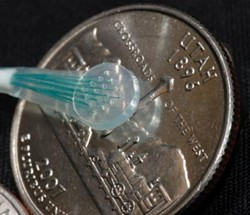Friday, September 10, 2010
Brain data decoded at University of Utah
Posted By Jesse Fruhwirth on September 10, 2010, 12:51 PM
About a year ago, I wrote a story about neuroscientists at the University of Utah who were implanting chips into patients brains and downloading data that's coded in "brain speak" they barely understood. That's beginning to change.---
According to a press release this week, assistant profession Bradley Greger and his team at Neural Engineering Lab have almost decoded the signals of 10 words that may be especially useful to severely paralyzed individuals. In trials, the researchers correctly identified whether the patient--brain chip implanted and sending data to computers--had said "yes" or "no" 76 to 90 percent of the time.
Toss the words hot, cold, hungry, thirsty, hello, goodbye, more and less, and their accuracy dropped. Nevertheless, they could identify in the brain data which word was said 28 to 48 percent of the time--which is nearly three to five times better than random chance.
Greger has said in the past that the Utah Electrode Array--invented and developed in Salt Lake City--and similar devices that transmit brain data are a "platform technology" with wide-ranging applications, including discovering the cause of epileptic seizures, helping paralyzed patients control external devices with their thoughts, and even restoring rudimentary vision to the blind. The chip used to decode the 10 words has fewer electrodes--and thus outputs less data--but they work off the same concept.
In my story last year, Greger described brain data as "voltage signals in a funny hybrid of analog and digital signals.” He said downloading brain data--with the use of a brain chip invented and developed in Utah--is the easy part, but decoding that data into anything meaningful is more difficult. "A mathematical
algorithm that makes sense of the brain’s language, Greger says,
probably will earn someone a Nobel Prize when it is discovered," I wrote then. Certainly, that is not what was discovered recently, but Greger and the Neural Engineering Lab are well on their way.
To read my story from last year, click here. If you're especially curious about this, go to the bottom of the story to listen to an hour-long conversation between Greger and I about his research.
To read the full press release from the University of Utah, click here.
| Follow Me: |
More by Jesse Fruhwirth
-
Johnny's Rotten
Johnny Bangerter wants to move forward as an activist but just can't shake his racist punk past
- Apr 10, 2013
-
Right of Way
Eviction of Occupy SLC is a loss for community
- Nov 23, 2011
-
The Limbo Party
Redistricting: How low can Utah Dems go?
- May 19, 2011
- More »




